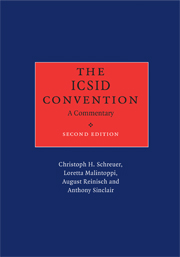Book contents
- Frontmatter
- Contents
- Foreword by Professor Sir Elihu Lauterpacht, CBE, QC
- Authors' preface to the second edition
- Table of cases
- List of abbreviations
- Text of the ICSID Convention
- Procedural calendar
- PREAMBLE
- CHAPTER I International Centre for Settlement of Investment Disputes
- Article 1 Establishment of Centre
- Article 2 Seat of Centre
- Article 3 Organization of Centre
- Article 4 Composition of Administrative Council
- Article 5 Chairman of Administrative Council
- Article 6 Functions of Administrative Council
- Article 7 Decisions of Administrative Council
- Article 8 No Remuneration for Members
- Article 9 Composition of Secretariat
- Article 10 Secretary-General and Deputy Secretary-General
- Article 11 Functions of Secretary-General
- Article 12 Panels of Conciliators and Arbitrators
- Article 13 Designation to Panels
- Article 14 Qualities of Panel Members
- Article 15 Periods of Office of Panel Members
- Article 16 Multiple Designations
- Article 17 Financing
- Article 18 Legal Personality of Centre
- Article 19 Immunities and Privileges of Centre
- Article 20 Immunity from Legal Process
- Article 21 Personal Immunities
- Article 22 Immunities of Parties and Witnesses
- Article 23 Archives and Communications
- Article 24 Tax Exemptions
- CHAPTER II Jurisdiction of the Centre
- CHAPTER III Conciliation
- CHAPTER IV Arbitration
- CHAPTER V Replacement and Disqualification of Conciliators and Arbitrators
- CHAPTER VI Cost of Proceedings
- CHAPTER VII Place of Proceedings
- CHAPTER VIII Disputes between Contracting States
- CHAPTER IX Amendment
- CHAPTER X Final Provisions
- Final Clause
- Consolidated bibliography
- Index by article
- Index by subject
Article 19 - Immunities and Privileges of Centre
from CHAPTER I - International Centre for Settlement of Investment Disputes
Published online by Cambridge University Press: 07 September 2010
- Frontmatter
- Contents
- Foreword by Professor Sir Elihu Lauterpacht, CBE, QC
- Authors' preface to the second edition
- Table of cases
- List of abbreviations
- Text of the ICSID Convention
- Procedural calendar
- PREAMBLE
- CHAPTER I International Centre for Settlement of Investment Disputes
- Article 1 Establishment of Centre
- Article 2 Seat of Centre
- Article 3 Organization of Centre
- Article 4 Composition of Administrative Council
- Article 5 Chairman of Administrative Council
- Article 6 Functions of Administrative Council
- Article 7 Decisions of Administrative Council
- Article 8 No Remuneration for Members
- Article 9 Composition of Secretariat
- Article 10 Secretary-General and Deputy Secretary-General
- Article 11 Functions of Secretary-General
- Article 12 Panels of Conciliators and Arbitrators
- Article 13 Designation to Panels
- Article 14 Qualities of Panel Members
- Article 15 Periods of Office of Panel Members
- Article 16 Multiple Designations
- Article 17 Financing
- Article 18 Legal Personality of Centre
- Article 19 Immunities and Privileges of Centre
- Article 20 Immunity from Legal Process
- Article 21 Personal Immunities
- Article 22 Immunities of Parties and Witnesses
- Article 23 Archives and Communications
- Article 24 Tax Exemptions
- CHAPTER II Jurisdiction of the Centre
- CHAPTER III Conciliation
- CHAPTER IV Arbitration
- CHAPTER V Replacement and Disqualification of Conciliators and Arbitrators
- CHAPTER VI Cost of Proceedings
- CHAPTER VII Place of Proceedings
- CHAPTER VIII Disputes between Contracting States
- CHAPTER IX Amendment
- CHAPTER X Final Provisions
- Final Clause
- Consolidated bibliography
- Index by article
- Index by subject
Summary
In the First Draft, the text of what later became Art. 19 was still attached to the general statement that the Centre shall have international legal personality (History, Vol. II, p. 619) and was evidently meant as an explanation and elaboration of the general statement on legal personality. Later, a list of specific legal capacities, previously contained in a separate Article, was attached to the general statement on legal personality and capacity (see Art. 18, para. 2) to form what subsequently became Art. 18. As a consequence, the text of what became Art. 19 was put into a separate Article (History, Vol. I, p. 92). The legal relevance of this Article was not clarified in the discussions which barely touched upon it (History, Vol. II, pp. 739, 740, 743).
As it stands, Art. 19 is no more than a general introduction to the subsequent Articles. The Section referred to covers Arts. 18–24. The statement “to enable the Centre to fulfil its functions” may help to establish the exact extent of the immunities and privileges set out in the Convention. But the travaux préparatoires contain no indication that immunities and privileges that do not serve the Centre's functions should be denied or interpreted restrictively.
- Type
- Chapter
- Information
- The ICSID ConventionA Commentary, pp. 60Publisher: Cambridge University PressPrint publication year: 2009



